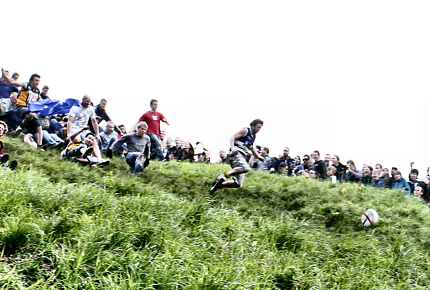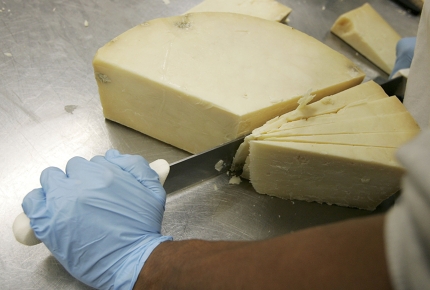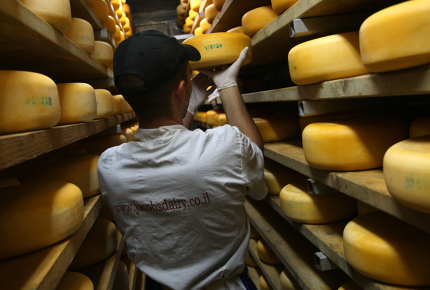The secret world of cheese rolling
With competitors set to chase a cheese down one of the steepest hills in Gloucestershire again, we send Daniel Fahey to Cooper’s Hill to find out more.
This is where the cheese stops rolling: a soulless coach house that serves Yorkshire puddings with its hot-plate breakfasts and as much pig as you can eat, for less than a couple of pints.
When I arrive, abandoned plates sit smeared in gravy, glowing beneath an arcade machine; crushed pink wafers cover part of the carpet.
The bar staff are dressed in all black, a company-wide effort to look professional, but that illusion expires when one thumbs coins into the gambler, hoping to pocket a post-shift premium.
Most customers are either chugging past Cheltenham on their way to Gloucester, or vice versa. It’s a pit stop for paint-slopped decorators squawking over a tools down tipple; a cheap chat-and-eat for young mothers and their gaggles.
But there’s so much urine showered around the toilet seat, you wouldn’t want to shit here, let alone settle down for lunch.
Yet every late May bank holiday it clutters with so many customers that the owners charge for car parking and – according to a barmaid at The Cheese Rollers down in nearby Shurdington – punters “drink the place dry”.
Location, it seems, is everything.
This is the nearest ‘boozer’ to Cooper’s Hill in Gloucestershire, the famed gradient where senseless locals hurl themselves deathwards after a rounded slab of double Gloucester every May bank holiday.
The chase has been taking place here since at least 1800, the cheese rolling maybe longer than 1,300 years.
Similar customs were once observed at England’s great hillside chalk carvings, Cerne Giant and the Uffington White Horse, where pagans launched circles of solidified sour cream downhill during midsummer gatherings.
Then the cheese would represent the sun or the circle of the seasons and the roll would have been part of a ceremony that included other harvest celebrations like the scattering of seeds.
 Cheese has been chased down Cooper's Hill since the 1800s
Cheese has been chased down Cooper's Hill since the 1800sCreative Commons / Michael Warren
When these festivities moved from midsummer to Whitsunday is unclear, but Jean Jefferies, author of Cheese Rolling In Gloucestershire, explains that the Cooper’s Hill Wake grew to encompass “wrestling, grinning, sack-racing, chattering, and dancing for ribbons”.
Corkscrewing close-fitting country roads, I climb from the pub to Cooper’s Hill itself. As the road narrows to a single car’s width, and cottages peek through hedges, the hill cocks tall like a real Gloucester Goliath, dressed in thick spring rain.
No equation (a gradient of 1:2, 1:1 in places) can sincerely impress its steepness; you have to stand at its toes and stare up to its nose to take in its almost perfectly perpendicular belly. More cliff than hill, tufts of tough grass tack themselves to its chest.
Even at its brow, the fencing loses its footing, but the views across Gloucestershire are remarkable. Under a Soviet-grey sky, the county busies itself: tiny cowslip-coloured cranes dig and shift by the Invista Factory, readying for 200 new residences; cars whoosh through wet thoroughfares; liquorice horses amble across damp pasture.
As unappetising as the plunge looks, it’s easy to see how competitors build the guile to stomach its plummet. Great heights give way to god complexes: one grand vista through the Eye of Providence and beholders feel immortal.
That’s how Bert Gregory won six cheeses in 1937; why a bequiffed Roy Mitchell, who lived at the foot of the hill, earned several cheeses without ever falling; how Lynda Burnett took home a double Gloucester in 1970 and 1971, breaking her collarbone both times, something a gap-toothed Paul Chandler repeated in 1975.
 Smart's have supplied the Cooper's Hill cheese since 1988
Smart's have supplied the Cooper's Hill cheese since 1988Justin Sullivan / Thinkstock
Organisers today are less infallible and trying to speak to them is as tough as old rind. Email conversations trail off, no one will go on record and I’m passed from pillar to pub in an attempt to talk cheddar with anyone involved.
The silence, I’m told, is down to increased police pressure. If run officially, the event would need to secure road closures and medical staff, and have police officers onsite. Former organisers estimated that would cost £250,000 – a figure that far outstrips the event’s income. That’s why the cheese roll has been held unofficially since 2010.
“In the absence of a recognised organiser,” police say, “anyone that facilitates the event could be deemed to be an organiser by default.” Today, the team work under the disguise of darkness.
Following a spate of injuries, police had safety fears ahead of the 1998 event, leading to the Cheese Roll Committee cancelling it. The crowds stayed away, but a small group of locals and committee members secretly rolled a double Gloucester at dawn.
That cheese, which was shared among the attendees, came from Smart's Traditional Gloucester Cheeses in nearby Churcham. They’ve been supplying the cheese wheels since 1988.
As I clatter off the main road in search of Smart’s, growing puddles spill out of their potholes and rain rattles the car roof. The sign for the cheesemaker shies behind some cow parsley. I pull in as a soaked farmhand shifts a bale of hay.
With wire brush eyebrows and a thick West Country accent, Rod Smart welcomes me into his cheesemaking building. He’s busy piling blocks of yellow curd in a huge steel vat.
They make three cheeses at Smart’s: a creamy single Gloucester, a tangy parmesan-like cheese called Harefield, and the delicious double Gloucester.
 The double Gloucester rolled at the Wake was made in October
The double Gloucester rolled at the Wake was made in OctoberDavid Silverman / Thinkstock
“We made the cheese for the cheese roll back in October,” Rod tells me, but it’s a wonder they ended up making any at all.
Gloucester cows weren’t suited to modern farming practices, so they faced extinction in the 1970s. Not great producers of dairy or beef, it took a meeting of three farmers, including Rod’s mother Diana, to save them.
They bought the last remaining herd at auction, 33 Gloucester cows, and fought for a Protected Designation of Origin stamp for single Gloucester cheese. Six farms now produce it.
“If you chucked a single Gloucester down Cooper’s Hill it would disintegrate,” Rod chuckles, hence why they roll a double Gloucester. Gouda cheese disintegrates too, he tells me, as its Dutch producers found out when they rolled one at last year’s event.
They’re not the only international visitors either. People have come from as far as Japan, America and South Africa to watch the event. Rod believes it went from a small local oddity to a worldwide phenomenon after the cheese roll found fame online.
“Personally, I think it started as some sort of wide game,” he says. “You get them all over the countryside. It’s just a gang of chaps from a couple of parishes who thought it was a good way to impress women.”
Rod laughs when I tell him about the incognito organisation, but the law has leant on the farm too.
Back in 2013 the police visited Rod’s mother, Diana, and advised her about the potential liabilities of supplying the event with cheese.
“A police inspector came here and said if they found that we were organising the event, we’d be responsible,” he says, “but they were only doing their job.”
And that’s what Rod is doing: his job. He can supply people with cheese, but what they do with it is up to them, and that’s why the event will roll for a while yet.
NEED TO KNOW
The Cooper's Hill Cheese-Rolling and Wake takes place on Cooper’s Hill near Brockworth, Gloucestershire every May bank holiday. For more information head to www.cheese-rolling.co.uk.
Smart's Traditional Gloucester Cheese (tel: +44 1452 750 225; www.smartsgloucestercheese.com), who make the double Gloucester rolled at the event, is located at Chapel Lane, Churcham, a short drive from Cooper’s Hill. You can see Rod make cheese at the farm every Tuesday and Thursday. Phone ahead to book.
Liked this? Then have a read of these:
The 20 craziest festivals in the world
20 islands you never knew existed
Do you have any Feedback about this page?
© 2026 Columbus Travel Media Ltd. All rights reserved. No part of this site may be reproduced without our written permission, click here for information on Columbus Content Solutions.









 You know where
You know where